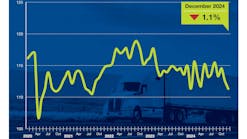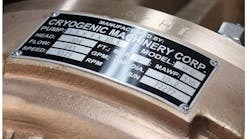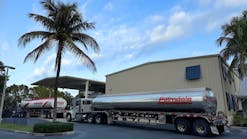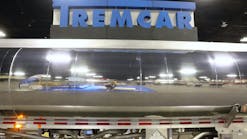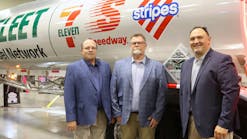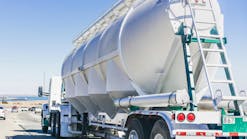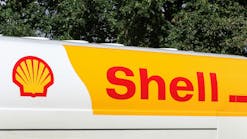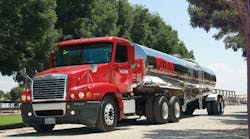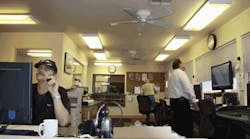Food hauling has played an important role at Ruan Transport for more than 78 years. Liquid and dry bulk food products became a focal point for the Des Moines, Iowa-based transportation and logistics specialist in recent years.
In April, Ruan reorganized its dairy dedicated contract carriage operation into the Dairy and Bulk Food Transport Division. With 700 drivers, 460 tractors, and 650 tank trailers, Ruan has invested in and is dedicated to the dairy and bulk foodgrade industry.
“Establishing the new division was a strategic decision,” says Jim Mulvenna, senior vice-president and general manager of Ruan's Dairy and Bulk Food Transport Division. “This new division helps show our commitment to the dairy industry. The division allows us to focus on liquid and dry bulk food transportation and to understand the industry inside and out.
“Ruan has a solid reputation as a strong leader in the transportation industry, and we are very focused on customer satisfaction. We are committed to helping our dairy and bulk food customers identify transportation and distribution efficiencies and providing solutions that help improve their bottom lines.”
West Coast
Based in Tulare, California, the Dairy and Bulk Food Transport Division operates out of 23 locations in California and New Mexico. The fleet hauls 1.25 billion pounds of milk a month (approximately 25,000 loads), and serves customers throughout California, New Mexico, Oregon, Idaho, Nevada, and Texas.
“We have made good progress with the Dairy and Bulk Food Transport Division, and we work with just about all of the dairy co-ops in the United States,” Mulvenna says. “We want to expand our foodgrade operations in terms of cargoes and geographic range.
“We want this division to grow into a nationwide operation. We already do food hauling in the Midwest, particularly in Iowa and Indiana. We have equipment available that could handle a business expansion, and we will haul any cargo that works with sanitary tank trailers.”
While milk dominates the foodgrade liquid cargo mix, Ruan's Dairy and Bulk Food Transport Division also transports liquid eggs, wine, edible oils, sweeteners, and juices. In addition, the fleet runs refrigerated trailers that are used for ice cream and cheese shipments.
Major acquisitions
The westward expansion that led to establishment of Dairy and Bulk Food Transport Division started in 2006. That was the year Ruan purchased Tulare-based Kings County Truck Lines Inc and affiliated operations (Cal Western Transport Inc, Fluid Transport Inc, California Milk Transport Inc, and MSM Trucking LLC). A year later, Ruan added Jim Aartman Inc in Ripon, California.
Those two acquisitions accounted for about 80% of the for-hire milk hauling capacity in California. “Ruan was looking for growth and expansion opportunities, and John Ruan III (Ruan chairman and chief executive officer) made the strategic decision to expand into the dairy and bulk food grade business,” Mulvenna says.
With its expansion into the West Coast food hauling market, the Ruan management team brought a dedication to build strong customer relationships and provide efficient, competitive services. Ruan has been a leading innovator of transportation technology over the years, and that commitment is very evident in the Dairy and Bulk Food Transport Division.
“We build true partnerships with our customers,” Mulvenna says. “We run the most efficient dairy transport operation in the nation and will continue to develop innovative technology for this industry. Our objective is to safely haul the most product in the shortest amount of time. We're spending time, effort, and money on modernizing the dairy transport process, including vehicle technology, tracking, and routing.
As part of the commitment to offer innovative transport solutions to the dairy industry, Ruan has partnered with the Innovation Center for US Dairy in support of the organization's E-SMART (Environmentally Sustainable Methods for Achieving Responsible Transportation) project. Mulvenna was named co-chair of the E-SMART initiative, which is working with trucking companies to reduce greenhouse gas emissions for fluid milk transport by 20% by 2020.
“Creating a more sustainable dairy supply chain significantly benefits everyone from dairy farmers to the American families that enjoy dairy products,” says Mulvenna. “As an E-SMART leader, Ruan is creating and implementing responsible model procedures that other trucking companies can adapt to achieve greater sustainability and fuel efficiency.”
Transportation and distribution account for 3% of fluid milk's greenhouse gas footprint, according to dairy industry officials. The E-SMART program is addressing that by developing dairy-specific transportation guidelines that will cut the dairy industry's transportation carbon dioxide emissions by 165,000 metric tonnes annually, potentially saving 16.5 million gallons of diesel fuel. E-SMART encourages dairy transporters to partner with the Environmental Protection Agency's SmartWay program, which aims to reduce the impact of freight transport on the environment through fuel efficient technologies and practices.
Ruan provides a full range of dairy transport services — from farm pick up to regional processed-product movements. The carrier picks up 10,500 loads a week from the West Coast dairy farms it serves. On average, it takes 700 dairy cows to fill a tank trailer.
Ruan runs its dairy transport fleet efficiently and safely in accordance with Department of Transportation regulations. Transports average 4.5 loads per shift, and the fleet operates on a slip-seat system that keeps most rigs running more than 20 hours a day. “Our drivers usually work 12-hour shifts, and we want our trucks running a minimum of 18 hours a day,” Mulvenna says.
Fleet management
Maximizing productivity calls for superb fleet management. Ruan's Dairy and Bulk Food Transport Division directs fleet operations through a pair of dispatch centers — one in southern California and one in the northern half of the state. The two centers work together to ensure seamless coordination of the fleet operations throughout the division's operating area.
Technology plays a big role in fleet management at Ruan. The company has made significant investments in its RedTrak system that gives Ruan drivers the ability to receive real-time dispatch information and wirelessly submit all data associated with each load.
“Ruan started work on the RedTrak system in late 2006, and we are still refining the system,” says Mike Elliott, Ruan vice-president and region manager for Ruan dairy operations. “We rolled out the latest version of RedTrak in 2009. Now Internet based, RedTrak started as an Excel spreadsheet application.”
The RedTrak system includes mobile devices that are linked to Ruan's Web dispatch application. Using the mobile units, drivers can quickly scan and transmit load information, automatically creating a detailed record of each milk shipment. Data captured includes milk weight and temperature, arrival and departure times from each dairy and receiving plant, sample IDs, and seal numbers. In addition to bar code scanning capabilities, the driver-assigned RedTrak handheld units have a built-in GPS system that enables dispatchers to track vehicle movement and activity.
Dairy and Bulk Food Transport Division dispatchers also make use of the storage tank monitoring technology adopted by some West Coast dairies. “We're able to monitor storage tanks at customers' dairy farms using wireless inventory management systems,” Elliott says. “We can be much more accurate in forecasting milk shipments and farm pick-ups. We're also able to do a better job of monitoring product temperature at the farm.”
High standards
The growing use of technology in the transport operation is just one of the reasons Ruan sets very high driver standards. The carrier's drivers also need a solid understanding of the dairy industry.
“We look for professional drivers who can represent Ruan well to customers and who have a feel for the dairy industry,” says Claude Balaam, Ruan operations manager for central
California. “We recruit drivers who will provide every customer with the same consistent service. We hire professional drivers who do the job the right way regardless of shift and even when nobody is watching.”
Bruce Henderson, two-time driver of the year for Ruan's West Coast operation, adds that the ideal Ruan driver loves what he is doing and has a winning attitude that encourages him to go the extra mile.
“This is the best job around, and it is the sort of work that should attract younger people,” says Henderson, who has driven more than three million accident- and incident-free miles over the past 26 years.
Despite a slow recovery from what is being called the Great Recession, Ruan's Dairy and Bulk Food Transport Division is growing.
Applicants must have two years of professional truck driving experience. Most importantly, they must successfully pass a rigorous background check showing a clean driving record. They can't have any drug or alcohol convictions. In addition, they must be at least 21 years old and have a commercial driver license.
Training program
Professional drivers selected by Ruan begin up to two weeks of orientation and training that starts with accompanying a driver trainer on a short trip. New hires go through the Smith System defensive driving program.
Trainers are providing detailed instruction on the new Comprehensive Safety Analysis 2010 program. “We have worked aggressively to make sure that we are ready for CSA 2010,” Balaam says. “We are preparing all of our professional drivers for this new federal program, because we believe CSA 2010 could give us a competitive edge.”
Product handling gets much of the attention during the training. All of the drivers in the Dairy and Bulk Food Transport Division must earn California certification to qualify for a weigher and sampler license. Among other things, this authorizes the driver to verify butterfat content, the basis on which dairy farms are paid for their raw milk.
“Too much is at stake when you are hauling milk, and our drivers must do all they can to avoid mistakes,” Balaam says. “We have a responsibility to ensure the integrity, safety, and security of every milk shipment we handle. We won't pick up a load of milk if it's not at the right temperature. We seal every shipment, and we keep a close track on those seals. Newly hired drivers must understand all of this before we send them out on the road.”
Tractor assignments
Drivers are assigned to tractors specified for maximum productivity in food hauling. The newest tractors in the fleet are Freightliner Century Class models, most of them in a daycab configuration. Ruan typically runs tractors on a five-year trade cycle.
The newest tractors in the dairy fleet have 380-horsepower Mercedes engines governed for a 58-mile-per-hour maximum road speed. The drivetrain includes Eaton Fuller 10-speed transmissions and Meritor tandem drive axles with a 3.90 ratio.
Other components include Fontaine fixed-position fifthwheels, Conmet aluminum hubs, Alcoa aluminum disc wheels, and Bridgestone tires. “We're running a few widebase single tires in certain locations,” says Kyle Heck, service manager at Ruan's Tulare shop.
Stainless steel sanitary tank trailers are supplied by West-Mark and Walker Stainless Equipment Co. The 6,700-gallon tanks and most are insulated with fiberglass. Ruan runs a few uninsulated tank trailers that are used to transport fertilizer and wastewater.
Tank equipment includes Olson and Runo sanitary vents, Thomsen three-inch rear outlets, and Kanaflex foodgrade hoses with ReSeal stainless steel fittings. About 40 tank trailers in the fleet have on-board product pumps. All of the tanks are fitted with a three-ball clean-in-place (CIP) system rated at 35 psi to 40 psi. The newest trailers have Hendrickson's Intraax axle and air suspension system.
Most of the tractor and trailer maintenance is handled in-house, and the Tulare facility is Ruan's main shop on the West Coast. Located on five acres, the Tulare shop employs 13 mechanics and has the ability to completely rebuild tractors and tank trailers.
“Most of our terminals have at least limited repair capabilities, but our shop handles major repairs for all of the Ruan vehicles operating in five western states,” Heck says. “We rebuild transmissions. We replace the aluminum jacketing around the dome area on tank trailers every 10 years or so. We do whatever it takes to ensure that the Ruan fleet looks good and performs well.”
Preventive maintenance is critical, and it starts with 90-day service intervals for tractors. Engine oil and filter are changed, and an oil sample is sent to Exxon to be tested for coolant, metal particles, and other contaminants. Tank trailers are inspected and serviced every 90 days in accordance with California requirements.
Certified scale
In addition to maintenance capabilities, the Tulare facility has a certified public scale. A bay in the shop is dedicated to exterior vehicle washes, and the carrier plans to add a sanitary tank wash system. Several other terminals in Ruan's Dairy and Bulk Food Transport Division already have foodgrade tank cleaning capabilities.
“We believe a tank cleaning system at the Tulare terminal will lower our operating costs and save time and labor,” Elliott says. “While we use the tank cleaning capabilities at many of the milk processing plants we serve, we believe it is important to do some of the tank cleaning in-house.
“We'll install a high-pressure system with the ability to handle kosher washes at temperatures up to 180°F. Our wash systems typically have steam, hot water, foodgrade caustic and detergent, and sanitizer.”
As Mulvenna puts it, Ruan will do whatever it takes to provide customers with the best possible transport service. Very simply, Ruan is hard at work building the best dairy and bulk food transport operation in the industry and bringing value and efficiencies to its customers. ♦


